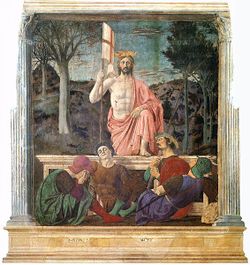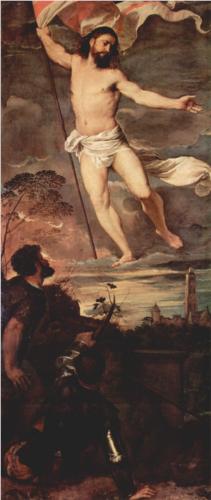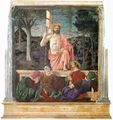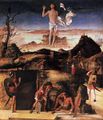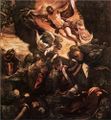Difference between revisions of "Category:Risen Christ (subject)"
| Line 1: | Line 1: | ||
[[File:Resurrection PieroFrancesca.jpg|thumb|250px|[[Resurrection of Christ (1465 Piero della Francesca), art]]]] | [[File:Resurrection PieroFrancesca.jpg|thumb|250px|[[Resurrection of Christ (1465 Piero della Francesca), art]]]] | ||
[[File: | [[File:Risen Christ Titian.jpg|thumb|250px|[[Risen Christ (1522 Titian), art]]]] | ||
*[[:Category:Events|BACK TO THE EVENTS--INDEX]] | *[[:Category:Events|BACK TO THE EVENTS--INDEX]] | ||
Revision as of 13:34, 23 August 2014
The Risen Christ refers to an episode in the life of Jesus of Nazareth. The episode is narrated only in the Gospel of Peter.
- Resurrection of Jesus : Risen Christ -- Descent into Limbo -- Empty Tomb -- Appearances of Jesus (Noli me tangere, Supper at Emmaus, Doubting Thomas) -- Ascension of Jesus
Overview
The actual moment of the resurrection of Jesus is not described in the earliest gospel narratives. The Gospel of Mark ends with the Empty Tomb. Matthew refers of the presence of Roman soldiers, sent to guard Jesus' tomb; they were unaware of the resurrection of Jesus, until the morning, when they saw the angel. In the Gospel of Peter the Roman soldiers become eyewitnesses of the actual moment of the resurrection during the night.
Risen Christ in ancient sources
Gospel of Peter
[35] But in the night in which the Lord's day dawned, when the soldiers were safeguarding it two by two in every watch, there was a loud voice in heaven; [36] and they saw that the heavens were opened and that two males who had much radiance had come down from there and come near the sepulcher. [37] But that stone which had been thrust against the door, having rolled by itself, went a distance off the side; and the sepulcher opened, and both the young men entered. [38] And so those soldiers, having seen, awakened the centurion and the elders (for they too were present, safeguarding). [39] And while they were relating what they had seen, again they see three males who have come out from they sepulcher, with the two supporting the other one, and a cross following them, [40] and the head of the two reaching unto heaven, but that of the one being led out by a hand by them going beyond the heavens. [41] And they were hearing a voice from the heavens saying, 'Have you made proclamation to the fallen-asleep?' [42] And an obeisance was heard from the cross, 'Yes.' [43] And so those people were seeking a common perspective to go off and make these things clear to Pilate; [44] and while they were still considering it through, there appear again the opened heavens and a certain man having come down and entered into the burial place. [45] Having seen these things, those around the centurion hastened at night before Pilate (having left the sepulcher which they were safeguarding) and described all the things that they indeed had seen, agonizing greatly and saying: 'Truly he was God's Son.' [46] In answer Pilate said: 'I am clean of the blood of the Son of God, but it was to you that this seemed [the thing to do].' [47] Then all, having come forward, were begging and exhorting him to command the centurion and the soldiers to say to no one what they had seen. [48] 'For,' they said, 'it is better for us to owe the debt of the greatest sin in the sight of God than to fall into the hands of the Jewish people and be stoned.' [49] And so Pilate ordered the centurion and the soldiers to say nothing. (trans. Raymond E. Brown)
Risen Christ, in Fiction
The actual moment of the Resurrection of Jesus was not a subject in Christian Art until the 14th century. The earliest representations of the Risen Christ bearing the victory flag described him in his Descent into Limbo or in his meeting with Mary Magdalene (see Noli me tangere). Gradually the scene took a life in its own focusing on Jesus rising from the sepulcher at night, generally surrounded by angels and bearing the victory flag. The Roman soldiers sometimes are asleep and unaware (following the Gospel of Matthew), sometimes are awake and terrified (following the Gospel of Peter). Sometimes the two traditions are harmonized showing some soldiers asleep and some awake.
- Risen Christ LucaRobbia.jpg
- Risen Christ AndreaRobbia.jpg
- Risen Christ GirolamoRobbia.jpg
- Resurrection Basaiti.jpg
External links
Pages in category "Risen Christ (subject)"
The following 20 pages are in this category, out of 20 total.
1
- Risen Christ (1455 Bouts), art
- Risen Christ (1459 Mantegna), art
- Resurrection of Christ (1465 Piero della Francesca), art
- Risen Christ (1477 Bellini), art
- Resurrection of Christ (1502 Raphael), art
- Resurrection of Christ (1515 Grünewald), art
- Resurrection of Christ (1518 Altdorfer), art
- Resurrection of Christ (1520 Basaiti), art
- Risen Christ (1522 Titian), art
- Resurrection (1525 Pontormo), art
- Risen Christ (1544 Titian), art
- Risen Christ (1565 Tintoretto), art
- Resurrection of Christ (1570 Veronese), art
- Risen Christ and Soldiers (1572 Pilon), art
- Risen Christ (1581 Tintoretto), art
- Risen Christ (1611 Rubens), art
- Resurrection of Christ (1700 Coypel), art
- Risen Christ (1850 Clésinger), art
- Risen Christ (1892 Nesterov), art
- Resurrection (1969 Breker), art
Media in category "Risen Christ (subject)"
This category contains only the following file.
- 1700 Coypel (art).jpg 324 × 405; 50 KB
